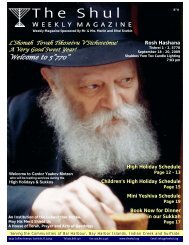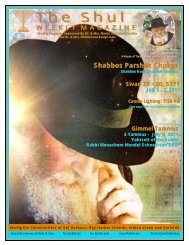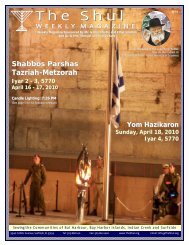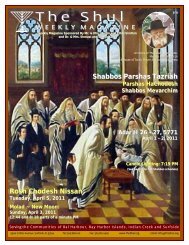Create successful ePaper yourself
Turn your PDF publications into a flip-book with our unique Google optimized e-Paper software.
Inspiration, Insights & Ideas<br />
Bringing Torah lessons to LIFE!<br />
Largest Jewish Camp Network in World<br />
Turns 55<br />
By Malina Saval and Joshua Runyan<br />
I n<br />
the spring of 1956, faculty of the central Chabad-Lubavitch<br />
grade-school yeshiva in New York faced the distinctly modern<br />
problem of summer vacation: They had no place to send their<br />
students to continue their studies during the summer months.<br />
A Lubavitch overnight boys’ camp had been established in the 1940s<br />
in Montreal, and since 1953, Camp Emunah in upstate New York<br />
provided a Lubavitch summer camp option for Jewish girls.<br />
But the New York students had nowhere to go and Rabbi Moshe<br />
Lazar sought out a solution. Just 22 years old at the time, Lazar<br />
approached the Rebbe, Rabbi Menachem M. Schneerson, of<br />
righteous memory, for guidance. On the face of it, the issue was<br />
relatively simple: The modern educational calendar had created a<br />
block of time in which kids were frequently without structure.<br />
But as so often happened when the Rebbe addressed a “problem,” he<br />
advised that this particular challenge actually offered a unique<br />
opportunity.<br />
Yes, there should be boys’ camp, the Rebbe responded. But it would<br />
be different: It would leverage the beauty of rural surroundings to<br />
provide a Jewish atmosphere, coupled with the warmth of Chasidic<br />
life, in a manner not possible in a year-round school environment. It<br />
would serve youngsters from both Jewish day schools and public<br />
schools and would allow each of them to partake of their favorite<br />
summer activities on the one hand, while simultaneously nurturing<br />
their spiritual identities on the other.<br />
Unlike other camps of the era, which served to protect religious<br />
students from wandering aimlessly through the summer, this camp<br />
would offer an open door to attract new students to the beauty of<br />
Jewish life.<br />
“There were a few Jewish camps in existence, but they were not<br />
doing much in the way of reaching out to children that were not<br />
already exposed to their Jewish backgrounds,” explains Lazar, now 76<br />
years old and a Chabad-Lubavitch emissary in Milan. “The Rebbe was<br />
very enthusiastic and with his blessing and constant involvement,<br />
we were able to successfully turn our camp idea into a reality.”<br />
In April that year, with nary a few months to get things in order,<br />
Lazar rented a property in Ellenville, N.Y. The Rebbe named the camp<br />
Gan Israel, literally “Garden of Israel” in honor of Rabbi Israel ben<br />
Eliezer, the 17th-century founder of Chasidism known as the Baal<br />
Shem Tov.<br />
“The Rebbe said that all children should be shown the greatest love<br />
and from this love, they become closer to G‑d,” says Lazar. “The idea<br />
behind Camp Gan Israel was to create a combination of the spiritual<br />
and the material and show that there is no conflict between the two.<br />
In this way children can lead full and enriched lives.”<br />
Rabbi Abraham Shemtov, who first signed on as the camp’s learning<br />
director and today serves as its executive director, recalls the Rebbe’s<br />
directives as revolutionary. Far from merely comprising the two<br />
identifies of a camp and a yeshiva, the uniqueness of Camp Gan<br />
Israel lies in its ability to make each opposing strain inform and<br />
strengthen the other. In short, Camp Gan Israel is “a camp on the<br />
outside and a yeshiva within,” the Rebbe would later emphasize.<br />
“Nobody had thought that this was possible to do,” explains<br />
Shemtov, who also serves as chairman of Agudas Chasidei Chabad,<br />
Recently in the News<br />
14<br />
the worldwide umbrella organization of Chabad-Lubavitch. “Summer<br />
camp was always either a place devoid of the protections offered by<br />
a yeshiva environment, or was solely concerned on essentially<br />
relocating the yeshiva to the countryside.”<br />
The Rebbe offered a third way, continues Shemtov. “Camp could be a<br />
new opportunity to do what the yeshiva couldn’t do. It could be an<br />
island; it could provide an overall 24-hour experience.”<br />
(Educators today, backed by several recent studies, similarly point to<br />
the immersive nature of camp as providing a unique opportunity to<br />
instill and nurture Jewish values.)<br />
Of the three times the Rebbe travelled outside of New York City after<br />
ascending to the leadership of Chabad-Lubavitch, all three were to<br />
the original Camp Gan Israel and Camp Emunah.<br />
Offshoots of that first Gan Israel reflect the central importance the<br />
Rebbe placed on the summer camp experience, says Shemtov. “Each<br />
place may look different, but when you begin to pull at the strings,<br />
you’ll find they each have the same foundation.”<br />
The first summer brought together 92 boys. Today, 55 years later,<br />
Camp Gan Israel, headquartered in Parksville, N.Y., represents the<br />
largest network of Jewish camps in the world. Run by Chabad Houses<br />
and affiliated institutions in more than 40 countries, including<br />
Canada, Australia and Chile, its day and overnight programs serve<br />
both boys and girls and cater to Jewish children of all backgrounds.<br />
“I had the time of my life,” Jeffrey Klein fondly recalls of the 10 years<br />
he spent as a child at Camp Gan Israel in Fenton, Mich., eight as a<br />
camper, one as a waiter, and one as a certified lifeguard.<br />
“The way they took religion and intertwined it with fun activities<br />
such as sports, baseball, soccer and swimming was a very positive<br />
experience for me,” he adds, “and, as a result, my religious<br />
observance grew.”<br />
Klein was so inspired by his camping experience – he celebrated his<br />
Bar Mitzvah at camp in 1974, the summer he turned 13 – he<br />
convinced his parents to keep a kosher home and enroll him in a<br />
local Detroit-area yeshiva. Today, the prominent podiatrist has three<br />
grown children, two of whom also attended Camp Gan Israel.<br />
“The friends that I made at camp – the children of friends that I met<br />
at camp – are worldwide,” says Klein, who, decades later, still sings<br />
songs that he learned at camp as a seven-year-old, including the<br />
Camp Gan Israel anthem. “A lot of people who went to this camp are<br />
amazing” Jewish leaders.<br />
Camp Gan Israel’s alumni include Rabbis Shmuel Lew, director of the<br />
Lubavitch House School in London, and Rabbi Moshe Feller, director<br />
of the Upper Midwest regional headquarters of Chabad-Lubavitch.<br />
“The camp experience is attractive to all kinds of parents,” explains<br />
Shemtov. “The Rebbe turned camp into a tremendous instrument in<br />
attracting youth with little in the way of Jewish involvement, who<br />
then were able to strengthen Judaism in their own families.”<br />
Daniella Uminer, program director of the Chabad Jewish Center of<br />
Martin and S. Lucie County, Fla., says that she and her husband<br />
founded the local Camp Gan Israel before they established a Hebrew<br />
school.<br />
Their area has a small, assimilated Jewish population, she says. “We<br />
started out with 15 kids and now we have at least 60. We’ve grown<br />
over the years, and it’s been a great journey.”<br />
What distinguishes Camp Gan Israel from a typical summer<br />
camp is the one-on-one attention devoted to each child,














